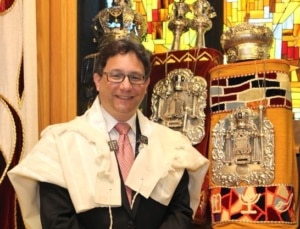Rabbi's Message
 Rabbi Charlie’s Mahashavoth – May 2024
Rabbi Charlie’s Mahashavoth – May 2024
Teach us to make our days count and so acquire a heart of wisdom (Ps. 90:12)
We may be familiar with this verse from our Shabbat and holiday morning services (one of the Psalms of Pesuqei d’Zimra), or we may be familiar with the modern version, “Don’t count the days, make the days count.” (Interestingly, attributed to Mohammed Ali!) Either way, we recognize that his message is encouraging us to live a life of meaning. We don’t know how long we will live, but if we live life in a way that gives expression to our values and beliefs, then it’s quite likely we will make a positive difference in the world and will be so appreciated by family, friends and associates.
That is certainly the message of Sephirat ha-Omer (“the counting of the omer”), the period between Pesah and Shavu’oth. Beginning the second night of Pesah, we symbolically count the ancient daily offering of barley until the celebration of the harvest on Shavu’oth. But our tradition has “spiritualized” this counting, transforming its significance in the natural world to its significance in the life of our souls.
We of course already consider this period one of spiritual preparation as it marks our people’s journey from Egypt to the revelation at Sinai and our covenant with God. It becomes a time of particular emphasis on study, culminating in the Tiqqun Leyl Shavu’oth, the night of study on Shavu’oth. A well-known custom is to study Pirqei Avoth,[1] the tractate of the Mishnah that is perhaps “the most explicit statement of rabbinic ethics,” on the Shabbatoth between Pesah and Shavu’oth.[2]
The mystics of our tradition saw Sephirath ha-Omer as “a time of purifying the self and striving for a deeper understanding of the God’s relation to the world.” Each day of the week, and each complete week, were connected with the seven lower sephiroth, elements of the Divine personality reflected throughout creation and particularly in the human person. Thus, each day becomes a meditation on different qualities (such as love and kindness, judgement and power) and how we practice them in our lives.[3]
The idea of conducting a daily examination of our lives has actually become a pretty common practice and life strategy. We utilize such a strategy for diet, exercise, financial responsibility as well as self-improvement. I am currently studying with some colleagues a tract, Sepher Heshbon ha-Nephesh (“Moral Accounting”). The core of the work is creating a chart that one should use to track one’s “sins” as part of a program of daily, weekly, monthly, and yearly self-improvement.[4]
While I am not necessarily suggesting we should run out and buy notebooks with graph paper, or, for our younger members, create an Excel worksheet, I am recommending that we do take this period to reflect on our relationship to our tradition and its values. Whether it is our own personal practice or involvement in Jewish life, putting our values into concrete action, thinking about how our life can be more meaningful – this is a time to reflect and to do.
We sat at the Seder and (hopefully) had meaningful discussions on the many different issues raised by the text of the Haggadah – or our own thoughts on freedom in today’s world. Let us not leave these thoughts at the Seder table. Let us use this period of Sephirath ha-Omer to continue our reflections, and, more importantly, to put them into practice. I hope that we can indeed count our days – they should be long and filled with health and happiness! – but may they also be days that count, that lead us to significant living.
Rabbi Charlie
[1] Pirqei Avoth is generally found in a siddur just after the Shabbat Minhah service. Or Hadash (gotta luv that name!), the commentary on Siddur Sim Shalom, has a wonderful commentary by Prof. Judah Goldin. Check out the copies of Or Hadash we have in the back of the sanctuary for use during services.
[2] It was also a custom to study Pirkei Avoth during the summer months.
[3] A series of meditations may be found in Siddur Lev Shalem, the online version of which we used during COVID. Some of you may have downloaded the text, or borrowed a copy from the synagogue, or, even better, purchased one for yourself. Most definitely recommended!
Other meditations may be found online, or in some books on the holidays. Not surprisingly, Chabad has a very nice booklet for the sephirah period.
[4] Written by a Polish Jew, Mendel Lefin of Satanow, it was actually based on a technique outlined in Benjamin Franklin’s “Autobiography”! (Franklin never finished this work, nor did he himself call it an autobiography.)

